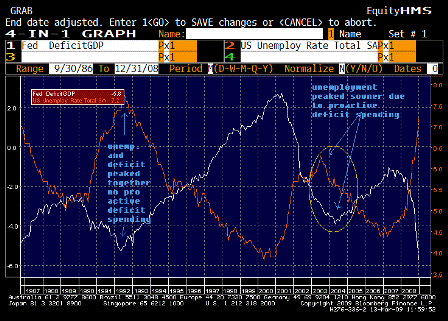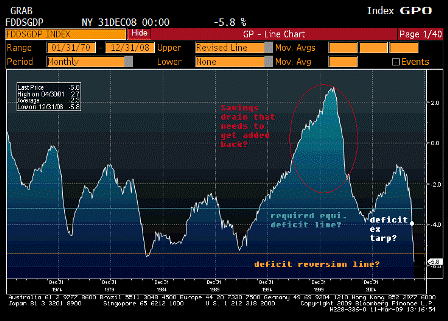Tom Hickey Reply:
April 3rd, 2010 at 12:38 am
MDM, the key here is the MMT concept of vertical and horizontal in relation to money creation. This is sometimes called exogenous (outside) and endogenous (inside).
When the government “spends,” the Treasury disburses the funds by crediting bank accounts. Settlement involves transferring reserves from the Treasury’s account at the Fed to the recipient’s bank. The resulting increase in the recipient’s deposit account has no corresponding liability in the banking system. This creation is called “vertical,” or exogenous to the banking system. Since there is no corresponding liability in the banking system, this results in an increase of nongovernment net financial assets.
When banks create money by extending credit (loans create deposits), this occurs completely within the banking system and results in a liability for the bank (the deposit) and a corresponding asset (the loan). The customer has an asset (the deposit) and a corresponding liability (the loan). This nets to zero.
Thus vertical money created by the government affects net financial assets and horizontal money created by banks does not, although its use in the economy as productive capital can increase real assets.
The mistake that is usually made is comparing what happens in the horizontal system with what happens at the level of government accounting. At the horizontal level, debt is the basis for horizontal money creation. Therefore, it is often assumed that debt must be the basis for the creation of money by government currency issuance. This is not the case.
Reserve accounting uses the standard accounting identities, but the meaning of “liability” is not “debt.” The husband-wife analogy for CB-Treasury accounting relationships is apt. Since a husband and wife are responsible for each others debts, neither can be indebted to the other. That is to say, reserve accounting is a fiction that does not represent real relationships, such as exist between a creditor and debtor in the horizontal system.
Moreover, government debt is not true debt either. At the macro level, the reserves that are transferred to banks through government disbursement are used to buy Tsy’s. That is, when a Tsy is bought, this involves a transfer of reserves from the buyer’s bank’s reserve account at the Fed to the government’s account (consolidating CB and Treasury as “government”).
When the Tsy’s are sold or redeemed, the reserves that were “stored” at interest are simply switched back, creating a deposit again. It’s pretty much the same as buying and redeeming a CD. It’s just a switch from demand to time back to demand in a bank account, and a switch between reserves and securities at the government level. That is to say, the government doesn’t have to draw on revenue, borrow, or sell assets to cover its “debt,” as households and firms do. It’s just a matter of crediting and debiting accounts on the (consolidated) government books, even though it may appear that there is a financial relationship occurring between the CB and Treasury due to the accounting. However, it’s just a fiction.
Therefore, the key to understanding MMT is this vertical-horizontal relationship. When one understands this, then Abba Lerner’s principles of functional finance become obvious. (1) Currency issuance through government disbursement is used to increase nongovernment net financial assets, and taxation withdraws net financial assets from nongovernment. (2) Debt issuance by the Treasury is a monetary operation for draining reserves to permit the CB to hit its target rate.
These principles are then applied to Y+C+I+G+NX to balance nominal aggregate demand with real output capacity in order to achieve full capacity utilization, hence, full employment, along with price stability. This is based not on theory requiring assumptions but on operational reality that can be represented using data, standard accounting identities, and stock-flow consistent macro models.
All of this and much more is explained in considerable detail at Bill Mitchell’s billy blog



